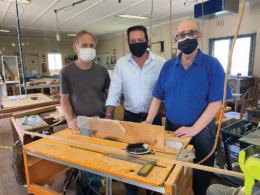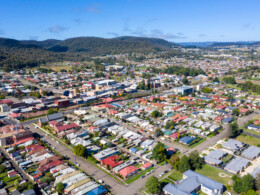Duty MLC for the electorate of Bathurst, Stephen Lawrence and Mayor of Lithgow Cr Cass Coleman welcome the Minns Labor Government’s partnering with coal-producing regions across NSW to deliver on its election commitment to establish the Future Jobs and Investment Authority.
The Authority will help guide the future economic development of the four coal mining regions – the Hunter, Central West, Illawarra, and North West – from coal production towards other economic opportunities and employment.
The 2025-26 NSW Budget will include $27.3 million over four years to fund the Authority, initially focussing on the Hunter and Central West regions.
This initiative will be backed by the Future Jobs and Investment Fund to unlock more than $100 million in funding held back under the previous Liberal-National Government’s Royalties for Rejuvenation scheme.
As part of its remit, the Future Jobs and Investment Authority will develop a framework to allow the funding to be spent on projects like infrastructure and post-mining land use planning, skills mapping, feasibility assessments and training programs. This will be done in concert with the Federal Government’s Net Zero Economy Authority.
The Minns Labor Government will also continue its existing commitment to deliver $22.5 million into the fund each year.
The model of the Future Jobs and Investment Authority follows the release of a proposed structure in mid-2024, and ongoing consultation with workers, communities and industry. The final Authority model integrates much of the feedback received by the government.
The Future Jobs and Investment Authority will include:
Establishing a coordinating Authority to be led by a Chief Executive Officer. The Authority will have a clear mandate to deliver tangible outcomes for coal-reliant regions.
Establishing four local Divisions in the Hunter, Illawarra, Central West and North West to support the Authority. This will ensure direct representation to the Authority and that all decisions are informed by local needs and priorities. Local Divisions will include representatives of industry, workers, local government and community groups to ensure local voices are guiding government action.
Assuring accountability and governance through an advisory board reporting to the Minister for Natural Resources. The advisory board will be chaired by an independent Chair/Advocate and membership will include the chairs of each Local Division.
Collaborating with the Net Zero Economy Authority and the Commonwealth Government to streamline projects and strengthen delivery.
Enshrining the Authority in legislation, providing long-term certainty for communities.
Currently, around 25,000 people are directly employed in coal mines. While coal mining will continue for decades to come this, highlights the importance of establishing the Authority to begin planning for a future beyond coal.
The Future Jobs and Investment Authority will prioritise:
Facilitating strategic land use planning, land prioritisation and activation, including land previously used for mining. This will enable new and emerging employment-generating industries.
Driving investment attraction activities to support the development of new industries in coal-producing communities.
“The future retirement of coal-fired power generation across Australia, including in the Lithgow region, is the critical reason why the Future Jobs and Investment Authority is coming to life. Rightly so, it will serve and support the local economy and the people of Lithgow to navigate their future in a range of important ways, from strategic land use to workforce planning for current and future generations.”
Stephen Lawrence, Duty MLC for the electorate of Bathurst
Developing new initiatives to ensure workers are equipped with necessary training to create a stable and secure future for them, their families and their communities.
Undertaking detailed data collection and analysis to inform the timing of impacts on workers and the economy and drive a strong evidence-based approach to government action.
Leading effective consultation, collaboration and partnership with local communities, and sharing that engagement across NSW Government agencies, and all three levels of government.
While coal will remain an important regional employer and economic driver for decades, global demand is forecast to decrease in coming decades. Under current planning approvals, by 2040 all four of the state’s coal-fired power stations, and 32 of the state’s 39 coal mines will close.
The NSW Government will legislate these changes in coming months and more information is available here: https://www.nsw.gov.au/fjia .










